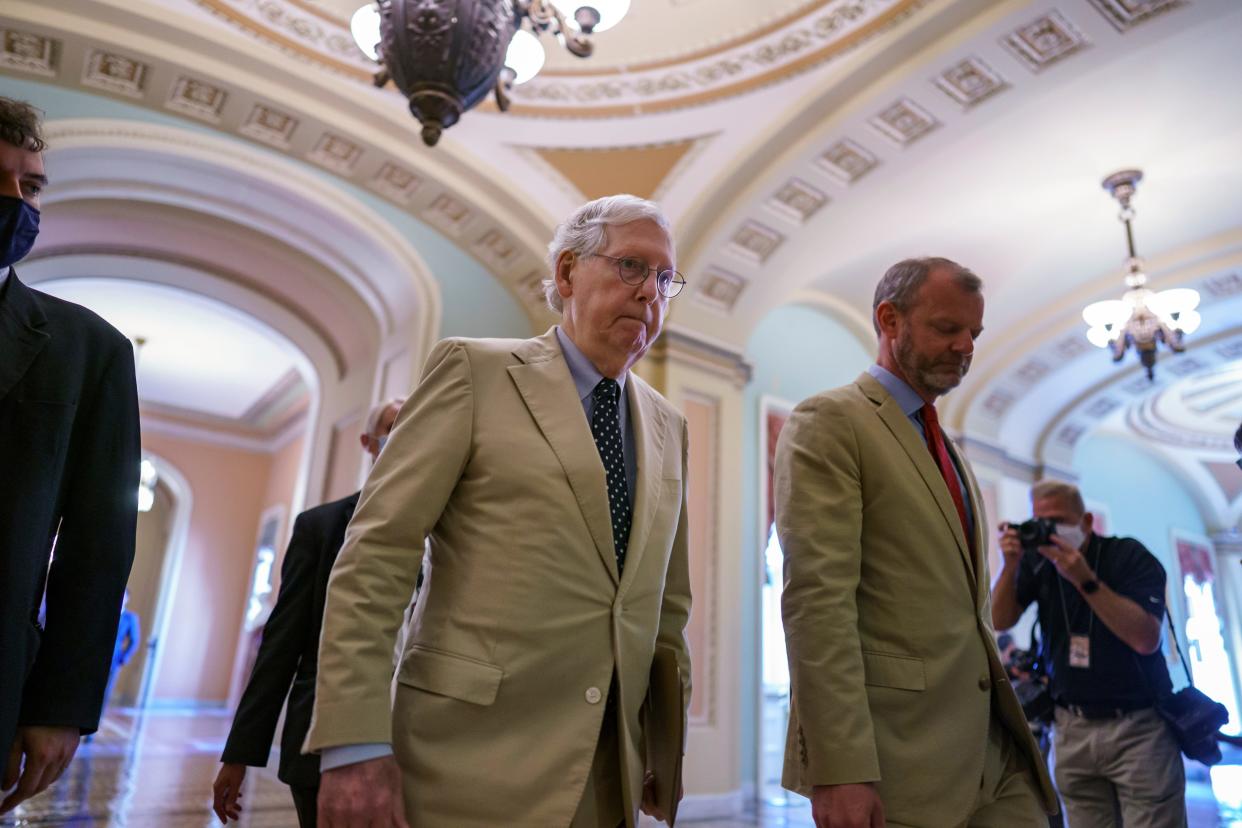Republican senators’ bipartisanship is all about getting re-elected

- Oops!Something went wrong.Please try again later.
To liberal critics, President Biden’s efforts to work with Senate Republicans on a near trillion dollar infrastructure deal looks like a fool’s errand. They see lurking behind Tuesday’s 69-30 bipartisan vote to pass the bill the scheming and malevolent hand of Senate Minority Leader Mitch McConnell. They also see the bill itself as having been emasculated by needless concessions to Republicans and a threat to the chances of a more muscular future bill passed under special rules that bar the use of the filibuster. They may also suspect, with good reason, that the passage of an important bill with broad bipartisan support weakens the case for scrapping the filibuster.
Why did Republicans pass the infrastructure bill?
Make no mistake, the Republicans who met with President Biden and then went on to hash out the bill with their Democratic colleagues are not altruists or dupes who have been beguiled by Biden’s charm or worn down by Senate Majority Leader Chuck Schumer’s persistence. The 17 Republicans whose support assured that the bill would get a final vote in the Senate and pass were motivated by the politician’s innermost passion: to get re-elected.
Rebuilding America: Infrastructure equals jobs, growth, competitive edge and better lives for millions
It may seem surprising, even unimaginable, that GOP senators would throw their lot in with a Democratic president who will certainty take credit for the passage of the bill in the Senate as validation of his strategy of restoring bipartisan cooperation on Capitol Hill, an objective that many progressives dismiss as dangerous nostalgia for a bygone Senate. Even more troubling to them as evidence of the inherent bad faith of the GOP are a pair of notorious statements by McConnell.
In early May, the Republican leader said that “One hundred percent of my focus is standing up to this administration.” And still fresh in the minds of progressives is McConnell’s vow in 2010 that, “The single most important thing we want to achieve is for President Obama to be a one-term president.” It would be easy to infer from these statements that the only reason McConnell joined the group of 17 Republicans who vowed to pass a bipartisan infrastructure bill worked out with President Biden was to sabotage it from the inside.
The reason for McConnell’s involvement was not subversion but something McConnell learned back in 2014, the year of President Obama’s second mid-term election when Democratic Majority Leader Harry Reid needed to protect a small number of vulnerable Democratic incumbents in places such as Arkansas, Alaska and North Carolina. Accordingly, he blocked amendments with Republican co-sponsors that he saw as harmful to vulnerable Democratic incumbents. The net result of these efforts to defend those Democrats was that the Senate had little accomplishment to point to. Republicans capitalized on this, gained the largest pickup of seats since 1980 and became the majority party in the Senate.
Shortly after the election, I had a conversation with one of McConnell’s top aides and asked him to explain the secret of his boss’s success. He told me that the Democrats had nothing to run on. They blocked all bills that Republicans tried to amend, so when they went home they had nothing to show for their time in DC.
Opinions in your inbox: Get the best insights and analysis delivered to your inbox
His comments echo a point made almost 50 years ago by a political scientist named David Mayhew in a book entitled “Congress: The Electoral Connection” It made a simple point that is as valid today as it was in 1974: members of Congress need accomplishments for which they can claim credit. It may be something as simple as renaming a federal building for a local war hero or for persuading the Navy to build a new destroyer in a shipyard in the state. Incumbents with no achievements are vulnerable. Those willing to share an accomplishment, even with someone on the other side of aisle, strike political pay-dirt.
Republicans passed the bill to prove they are working
That is the logic that prompted McConnell to green-light early negotiations between Senator Shelley Moore Capito of West Virginia and the president, and later with a bipartisan group of 20 senators on an infrastructure bill. And it is precisely that category of legislation that offers the greatest opportunity for credit-claiming on all sides. Infrastructure bills promise relief from crowded highways, dangerous bridges, anemic internet signals, tainted water and, above all, create local jobs.
Rebuilding America: After Florida condo collapse, can we take infrastructure seriously?
Liberals may scoff at the notion that there is also some amount of courage involved for a Republican member of Congress to cooperate in a major bill with Democrats in light of the sideline sniping at the bill by ex-president Trump. But even some GOP senators facing voters in 2022 are supporting the infrastructure measure and are betting – astutely I think – that the benefits of the infrastructure bill will be perceived by their constituents as more consequential than the cheap shots of a former chief executive who could never get the job done.
Ross K. Baker is a distinguished professor of political science at Rutgers University and a member of USA TODAY's Board of Contributors. Follow him on Twitter: @Rosbake1
You can read diverse opinions from our Board of Contributors and other writers on the Opinion front page, on Twitter @usatodayopinion and in our daily Opinion newsletter. To respond to a column, submit a comment to letters@usatoday.com.
This article originally appeared on USA TODAY: Republicans don't care about infrastructure. They care about optics.

